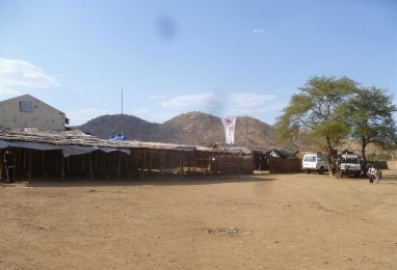MSF suspends operations in Sudan conflict zones
January 29, 2015 (KHARTOUM) – The Brussels-based operational centre of Médecins Sans Frontières (MSF) announced on Thursday it was suspending its activities in Sudan as it was no longer able to reach communities in the greatest need.

The Brussels-based section of MSF, which had been focusing its work in the conflict-affected states of Blue Nile, East Darfur and South Darfur where hundreds of thousands of people are displaced and in need of assistance, said the situation had now become untenable.
“Whether we ask for access through dialogue and meetings, seek negotiations through influential partners to the government or speak out in media, nothing seems to have the slightest impact,” Bart Janssens, the director of operations for MSF in Brussels.
“Our experience is that the Sudanese government arranges meetings specifically to prevent international aid, rather than to facilitate it. We have drawn the desperately sad conclusion that under the current circumstances, we cannot do emergency and life-saving work in three major conflict-affected parts of Sudan where we are desperately needed,” he added.
MSF says it has been repeatedly denied access to Blue Nile state, where conflict erupted in 2011 between the Sudanese Armed Forces (SAF) and rebels from the Sudan People’s Liberation Army-North (SPLA-N).
HOSPITAL TARGETED
While other sections of MSF continue to work in Sudan, its Paris-based section was also forced to suspend activities in South Kordofan state indefinitely following the targeted bombing of its hospital in Frandala on 20 January.
“The Sudanese government’s approach to international humanitarian presence in the conflict areas was starkly revealed last week when an Sudanese air force fighter jet targeted and bombed a hospital run by our MSF colleagues in South Kordofan state,” said Janssens.
“The government has many ways to shut off our access to the people who are in the greatest need, and uses them. High-level meetings we have attended have made it clear that humanitarian assistance to populations most affected by conflict in Blue Nile state and southern areas of Darfur will continue to be blocked and restricted as long as military operations are prioritised over humanitarian assistance,” he added.
In 2011 and 2012, MSF teams in the refugee camps across the border in South Sudan faced a well-documented health crisis as some 100,000 Sudanese refugees fled across the border in fear of their lives. Some died making the journey, while others arrived so weak that they died soon after arriving in South Sudan.
At the time, death rates in the camps are reported to have reached more than double the recognised emergency mortality thresholds.
Following the eruption of conflict in Blue Nile the state was declared a no-go zone, with international aid workers blocked from entering.
“The refugees remain trapped, still entirely dependent on humanitarian aid for their survival, but terrified of returning to Sudan,” said Janssens.
“We continue to care for those that managed to escape to South Sudan, but our teams in Sudan are not allowed to even assess the needs [of civilians], let alone provide assistance,” he added.
DARFUR OPERATIONS AFFECTED
MSF says its has also been unable to work in East Darfur since its team members were arrested and removed from the area without explanation in December 2012.
In March and April 2014, an MSF reinforcement team of emergency specialists was denied travel permits to El Sereif camp for displaced people near South Darfur capital Nyala, severely limiting the agency’s ability to provide emergency care.
MSF says that at the time clean water provision in the camp was below a third of the recognised emergency minimum and waterborne diseases such as hepatitis E were rife.
According to the United Nations, there were about 400,000 people newly displaced in the wider Darfur region in 2014, with a total of 2.3 million people displaced country-wide and 6.9 million in need of humanitarian assistance.
The Brussels-based MSF said it remains committed to providing emergency care to conflict-affected populations in Sudan, and will continue pursuing all avenues available to provide the necessary care.
US CONDEMNS AERIAL BOMBINGS
Meanwhile, the United States has strongly condemned the 20 January bombing of MSF’s hospital in Frandala.
“Targeted attacks by the Government of Sudan against civilians and humanitarian workers in conflict zones demonstrate the government’s disregard for the wellbeing of its people and its international obligations,” said US State Department spokesperson Jen Psaki.
The government’s increased military activity in 2014 reportedly resulted in a sharp escalation in civilian casualties, as well as causing widespread displacement and damage to public infrastructure.
It has also been blamed for causing severe disruption to agricultural activities and exacerbating the already critical humanitarian situation.
The humanitarian crisis has affected more than 1.7 million people and forced nearly 265,000 Sudanese refugees to flee to South Sudan, Ethiopia, and Kenya, aid agencies say.
“The United States reiterates its call upon the Government of Sudan to halt its campaigns of armed violence against its own citizens. These attacks further undermine the enormous humanitarian response needed to support those who require basic life-saving services,” a statement from the US State Department said.
“The United States remains committed to the people of Sudan and is providing more than $297.5 million in humanitarian support in fiscal year 2014 and 2015 to date,” it adds.
(ST)
